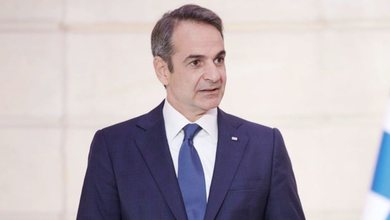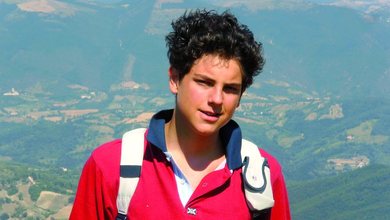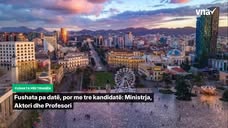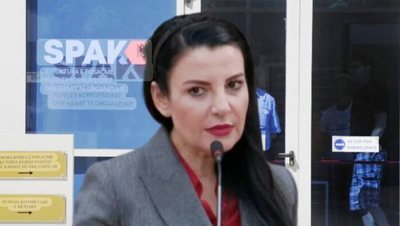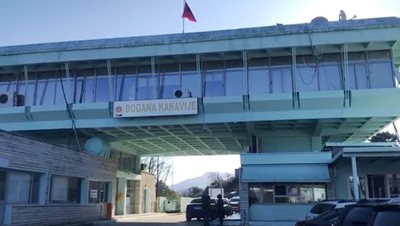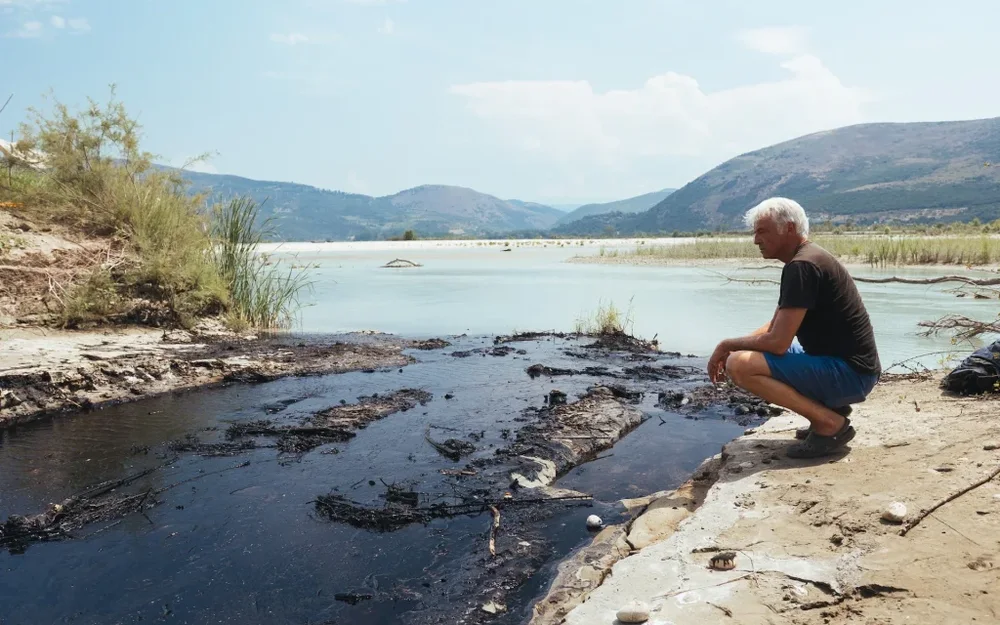
High in the mountains of Albania, a once-untouched stretch of river now resembles a construction site.
A place that was supposed to be a haven for species like otters, Egyptian vultures, and the critically endangered Balkan pelican has now turned into an ugly chaos, filled with plastic, pieces of Styrofoam, and concrete.
Beds of white gravel have been eroded by heavy machinery. Large blue pipes are piled up by the side of the road, ready to be installed. Engineers are in the process of diverting millions of liters of water from the mountains to the Adriatic coast, where a construction boom is transforming what was until recently considered Europe's best-kept holiday secret.
“They are taking this water and sending it to the coast for tourist developments and luxury resorts,” said Kaltrina Hyka of EcoAlbania, an environmental organization.
"You can already see that there is very little water left. We have been pursuing this case in the courts for a year and a half. The process is still ongoing, but in the meantime, the work continues."
The Shushica is a tributary of the much larger Vjosa River, one of the last wild rivers in Europe, flowing freely, with its silt-laden waters, unimpeded by dams, rapids or other blockages.
In 2023, after a decade-long and much-vaunted struggle, the 170-mile-long Vjosa was declared the first wild river national park in Europe, with its protection seemingly guaranteed forever.
The Albanian government was praised for its vision, with Prime Minister Edi Rama calling it "a truly historic moment."
But two years later, there is a huge gap between the promises made then and the current situation on the ground.
The Vjosa, far from being an untouched river paradise, is in serious danger.
Much of the damage being caused to the river, which originates in the Pindus Mountains in Greece and flows into the Adriatic, is directly related to the extraordinary tourism boom that this small Balkan country has experienced in recent years.
“Uncontrolled, large-scale tourism development threatens the integrity of the park,” a report by a coalition of environmental groups warned in July.
Ten years ago, when Albania was still considered one of the last frontiers of Mediterranean tourism, around three million people visited it.
Since then, visitor numbers have increased significantly – in 2023, around 10 million tourists arrived. Last year, this small nation, with a population of just 2.4 million, welcomed almost 12 million tourists.
Celebrities including singer Dua Lipa, Donald Trump's daughter Ivanka, and singer Enrique Iglesias have visited Albania. Lipa was born in London to Albanian parents and now holds Albanian citizenship.
Mr. Rama, who won a historic fourth term as prime minister in May, dreams of attracting up to 30 million tourists by 2030.
Mirela Kumbaro, Albania’s environment minister, told The Telegraph that the water diversion project began in 2019, four years before it was declared a national park, and that “independent studies” have shown that it will not harm the river’s biodiversity “or the ecological integrity of the park.”
But water extraction is by no means the only threat to Vjosa.
Gravel is being dug up by excavators and used for construction, including the construction of a giant new airport at the mouth of the river, amidst wetlands that are habitat for wild birds and golden jackals.
Test flights have already been conducted and the airport, which will be capable of receiving transatlantic aircraft, is expected to open next summer.
It is part of a strategy for the development of southern Albania, which also includes plans by Jared Kushner, Donald Trump's son-in-law, to build a £1.2 billion mega-resort with 10,000 rooms on an untouched stretch of coastline.
In other parts of the river, bitumen, a black, sticky liquid, is extracted for use in road construction, while the waste is dumped in large areas right on the riverbank.
And the river is being systematically polluted by numerous oil spills coming from hundreds of wells scattered across the hills and valleys on both sides of the Vjosa.
They suck oil from underground and pump it through cracked, leaky pipelines to decrepit concrete bunkers.
Instead of treating the oil-polluted water produced by industry, unscrupulous oil companies simply dump it into streams, from where it ends up directly in the Vjosa River.
Crouching at the edge of a stream, biologist Leonard Sonten touches with a stick a thick mass of shiny black oil that is slowly seeping into the water.
“Look at this – we are in the heart of a national park. If this happened in Yellowstone or the Serengeti, people would go crazy,” said the project manager from EuroNatur, a German nature conservation organization. “The national park is being treated like a garbage dump. It’s unbelievable.”
Bitumen has been spilled into the stream from a nearby cluster of oil wells. Standing on the banks of the Vjosa, the smell of oil is overwhelming – like being in a car factory.
Among the reed bushes stands an old refrigerator door, some orange plastic tubes and discarded cigarette packets. About a hundred meters away is a small farm, where Friesian cows and dirty sheep graze on the grass.
A sun-bleached Albanian flag – a black double-headed eagle on a red background – flutters from a wooden pole.
“Oil companies collect this oil-contaminated water and then release it into streams. We have been monitoring this for eight years and it happens constantly. And this happens right in the heart of the national park,” said Olsi Nika, executive director of EcoAlbania.
The organization fought for a decade to declare the Vjosa River a national park.
During this battle, they opposed dozens of proposals to build dams along the river. This, at least, was a clear victory – the government has pledged that no dams will ever be built.
But, with authorities seemingly turning a blind eye to actions that deeply damage the Vjosa and its entire ecosystem, the battle for the river has begun again with full intensity.
“Albania is no longer the hidden treasure of Europe. They are building everywhere, they are destroying the environment. They only think about today, not tomorrow,” said Esmeralda Topi, an activist from a fact-checking organization called Faktoje, which is holding the government accountable.
“They say they are protecting the river, but look – the protection is only on paper. On the ground, the situation is completely different.”
Albania is sold as an undiscovered green corner of Europe, with empty bays, long sandy beaches, wild mountains and clean rivers. But the rhetoric does not match the reality.
At a bend in the river near the southern town of Tepelena, lies a sight even more shocking than the oil spill.
A huge garbage dump sits right on the banks of the Vjosa, just a few meters from its gravel fields and mint-colored waters. Crows peck at the foul-smelling waste. Plastic flies in the wind. There is no separation of materials here, no recycling, no waste management system.
“Either they burn it every now and then to try to remove it, or they wait for the winter floods and the waste goes into the river. It’s like in Africa,” said Mr. Nika, who recently won a major award for his fight to save the Vjosa. “This is just one municipal landfill along the river. There are many more.”
Oddly enough, authorities are building a new national park center right next to the landfill. Environmentalists hope that the shame of the landfill’s proximity will spur the government to act, but there are currently no plans to clean up and rehabilitate the land. The government says that all of these harmful activities – gravel extraction, water diversion, waste dumps and oil spills – will be phased out within 10 to 15 years.
Ms. Kumbaro, the Minister of the Environment, says that many of the problems date back to the time of communism in Albania, which lasted until 1990, and the years of transition to democracy that followed.
“Many of these activities have been non-functional for years, but their environmental footprint remains,” she said, emphasizing that the government is doing its best to improve waste management and wastewater treatment along the Vjosa.
“We are working to eliminate legacy pollution, combining rehabilitation with new infrastructure and sustainable economic alternatives for local residents who have lived near the Vjosa for centuries and cannot be excluded in a few months from the activities that are vital to them,” she told The Telegraph. Meeting the conditions for national park status is “a complex and long-term process” that requires “time, capacity building, investment in infrastructure and close cooperation with local communities,” she added.
But for environmentalists, does the declaration of the national park in 2023 now seem like an empty victory?
“Yes and no,” said Mr. Olsi. “We managed to stop all the proposed dam and hydroelectric projects, which was a great success. But there is still a lot to do.
“We have this treasure, a wild, uninterrupted river, one of the last in Europe, and it is being treated like a garbage dump. We need to put pressure on the Albanian government to clean up this mess. We have hope – but it will not be an easy fight.”/The Telegraph


